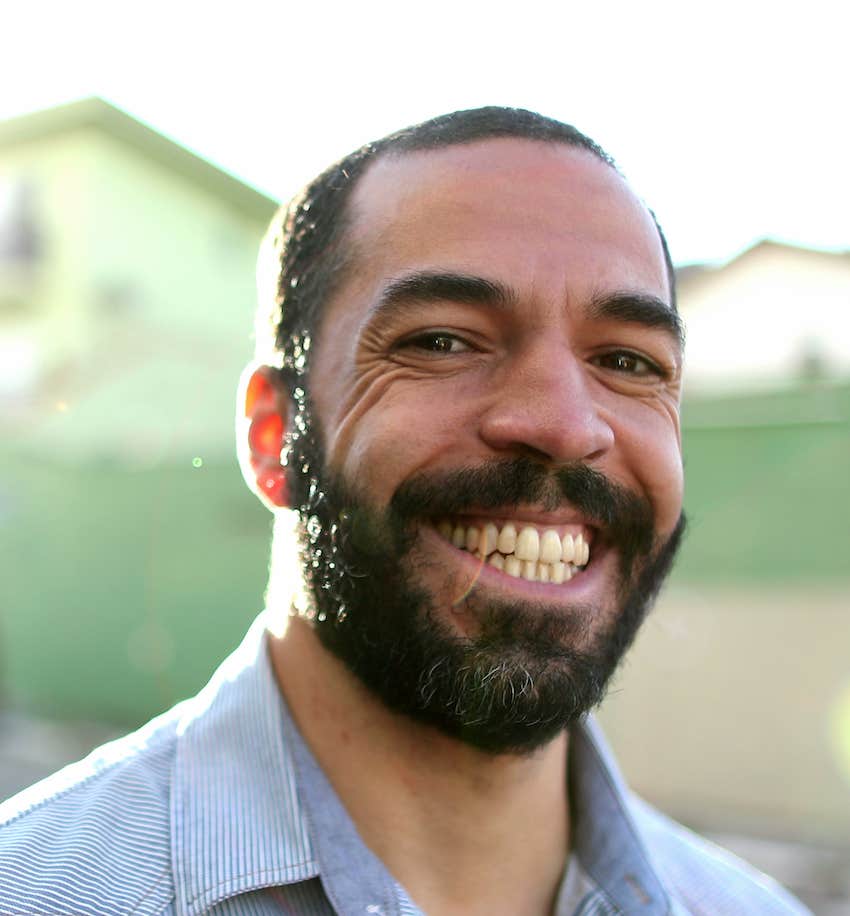7 Things That Are Easy For Naturally Happy People, But Hard Work For Everyone Else
Just because it's a challenge doesn't mean it's impossible.
 Tabitha Turner | Unsplash
Tabitha Turner | Unsplash Most people believe happiness is just a feeling you sometimes stumble upon — if you’re one of the lucky ones. Other people believe anyone can be as happy as the happiest people if they just choose to be. The truth is somewhere in the middle. There are things that happen easily for people who are naturally happy that others have to work hard toward, but that work is possible.
It turns out there are very specific things you can do to experience more happiness in your life. But before getting into the keys to a happy life, let’s explore things come easier for people who are naturally more happy.
Seven things that come naturally for happy people, but can be worked toward, too
1. They decide to be happy
It might sound silly, but sometimes simply deciding you want to be happy and then following that decision up with appropriate action can make you happy. It doesn’t mean that you’re flipping some kind of happiness switch. It does mean that you’re paying attention to your thoughts and attitude.
Happiness is easier to attain when you have a positive attitude and tend to be a glass-half-full person. It’s also easier when you can manage your emotions and thoughts and redirect them toward happiness when appropriate.
When you decide to be happy, you’re taking responsibility for your happiness. You’re not letting someone else have control over whether you’re feeling contentment or happiness, but if they contribute to it, that’s icing on the cake.
Taking this responsibility means you’re going to do what’s necessary to experience more joy in your life. You’ll look for ways to increase the pleasure you experience every day.
2. They expect to be happy
 Xavier Lorenzo via Shutterstock
Xavier Lorenzo via Shutterstock
Your perceptions color everything about your experiences. Have you ever noticed that when you expect to have a bad day, you usually do? Well, the same thing happens when you expect to be happy.
Positive expectations can help form your experiences into good ones. Of course, unexpected things can still happen, but when you choose to expect happiness, you'll tend to gravitate toward it.
One of the easiest ways to condition yourself to be happy is to look for joy each day. It may be just a fleeting glimpse of a cloud that reminds you of a tree or a flower, but when you take the time every day to notice when you have a positive emotion, you’ll start building your expectation of happiness.
Psychologist Cortney Warren suggested, "Experiencing happiness requires building a life that brings greater life fulfillment and satisfaction. To do that, be grateful. Think accurately and focus on what you already love about your life. Cultivate connecting relationships. And find greater meaning and purpose. The better you feel about your life in general, the more likely you are to experience feelings of happiness throughout your day."
3. They are grateful
An attitude of gratitude, practicing appreciation, and accepting "what is" can all influence how happy you feel. Research in positive psychology published by Harvard Health has verified there is a positive association between being grateful and happy.
Part of focusing on gratitude means that you’re not complaining or focusing on worry without searching for the cause to resolve it.
Being grateful doesn’t mean that you’re always on the lookout for something amazing to be thankful for. You can be thankful for the little things. You can be grateful for a good stretch, seeing someone you love smile or even just the feel of the sunlight on your face.
Maybe you need to celebrate that you got the dishes washed or loaded in the dishwasher. Maybe it’s time for a high-five with your puppy when they understand what “sit” means. Maybe you deserve to celebrate the prospect of the day when you first open your eyes in the morning.
4. They forgive
Most get forgiveness and condoning poor behavior confused. Forgiveness is about letting go of experiences and choosing to move on. It's not about condoning or approving of poor behavior in any way.
When you can forgive shame, guilt, anger, resentment, and any trauma you experienced, you tend to feel lighter and happier. Shame, guilt, anger, resentment, and trauma weigh you down and keep you from being your best.
When you can accept and forgive yourself and others for imperfection, you can be more present. And when you’re able to focus on the present moment, it’s easier to find the joy inherent in it.
5. They are connected
Feeling connected is empowering. And there are all kinds of ways to feel connected.
You can feel connected to yourself, to others, and even to the ineffable life force that flows through us all. Some call this sense of connection "love."
You also can feel connected to your purpose and passion. You may feel a great sense of contentment when you’re connected to your passion and purpose in life.
You can achieve connectedness by increasing your self-awareness, practicing self-care, meditating, spending more time in nature, and contributing to the world in some way.
Eleanor Roosevelt said, “Happiness is not a goal; it is a by-product.” Happiness can be found through actively choosing to connect.
6. They are themselves
 True Touch Lifestyle via Shutterstock
True Touch Lifestyle via Shutterstock
It’s nearly impossible to be happy when you don’t allow yourself to be who you truly are. When you try to mold yourself into who someone else wants you to be or who you think you should be, you’re disrespecting yourself.
And it’s pretty hard to be happy when you’re disrespecting yourself and pretending to be someone you’re not.
When you truly embrace your imperfections and unique perspective, you become confident. Confidence then allows you to more fully explore your world and place in it. And the exploration allows you to expand your limits.
Think of it as a confidence-happiness cycle. As you get to know yourself, you feel more confident and experience more contentment.
7. They share happiness
Have you ever noticed that it tends to be easier to match someone’s emotions instead of bringing joy with you? But what if you do choose to share your happiness — even with a smile?
Doesn’t that make you happier, too?
Sharing your happiness is one fairly easy way to expand your happiness and that of those you encounter. You can share it through a great story, a hug, a kind word, or even a smile.
These seven paths to finding happiness are just the beginning. You may find your keys to a happy life within this list or just be inspired to search in another direction. Finding happiness requires action, and you won’t find your sustained sense of well-being without taking action.
Happiness is often thought of as any positive emotion. Words that people will often use to describe being happy include bliss, joy, gratitude, contentment, delight, and enjoyment.
Yet these terms aren’t specific enough for happiness researchers because they want something they can measure. According to Berkley's Greater Good Science Center, researchers tend to define happiness as “subjective well-being.” This means the more satisfied people describe themselves as being along with the amount of positive emotion they experience, the greater their subjective well-being and the greater their happiness.
What this points out is happiness is about much more than a fleeting or temporary emotion. Happiness is about the experience of more positive than negative emotions and an overall sense of satisfaction with your life.
Why being happy is important
It turns out there are more benefits to happiness than just a general sense of feeling good.
Research in the Journal of Happiness Studies supports the connection between happiness and health.
- When you’re happy, you’re more likely to have healthier lifestyle habits, including a healthier diet, getting regular exercise, and even better sleep.
- Your immune system is stronger, so you’re less likely to catch colds. You’re more resilient to stress.
- Happiness can help lower blood pressure.
- Happy people tend to live longer.
- Your perception of pain may be reduced — especially if you have a chronic pain condition like arthritis.
The American Psychological Association suggests you’ll be more successful across multiple areas of your life besides your health. These areas include marriage, friendship, work performance, community involvement, and mental health.
The same research even shows that happiness precedes many different types of success. In other words, we start to achieve more of our goals and find greater satisfaction in our lives when we’re happy.
What’s interesting is that there isn’t just one way to find happiness. Happiness, just like every other emotion, is a personal experience.
Despite its nature, you can often recognize happiness in others — just as they can recognize it in you.
The problem is there isn’t a one-size-fits-all formula for happiness. That’s because it is a subjective experience. What makes you happy may not make others happy.
Because we are all unique, what exactly brings you joy will be unique, too. However, there are some similarities.
What if it doesn’t work?
However, finding happiness isn’t always easy. Sometimes, we have challenges that we need support to overcome. Sometimes, that support and encouragement can come from family, friends, or a life coach.
But if you find that you have difficulty finding or sustaining happiness no matter what you do, it might be a good idea to talk with a therapist. Therapists are trained to help people find the support they need to begin finding their keys to a happy life.
The good thing is that you can experience happiness as more than just a fleeting emotion. You just need to find your unique keys to unlocking your well-being and contentment.
Karen Finn is a divorce and life coach. Her writing on marriage, divorce, and co-parenting has appeared on MSN, Yahoo, Psych Central, Huffington Post, Prevention, and The Good Men Project, among others.

